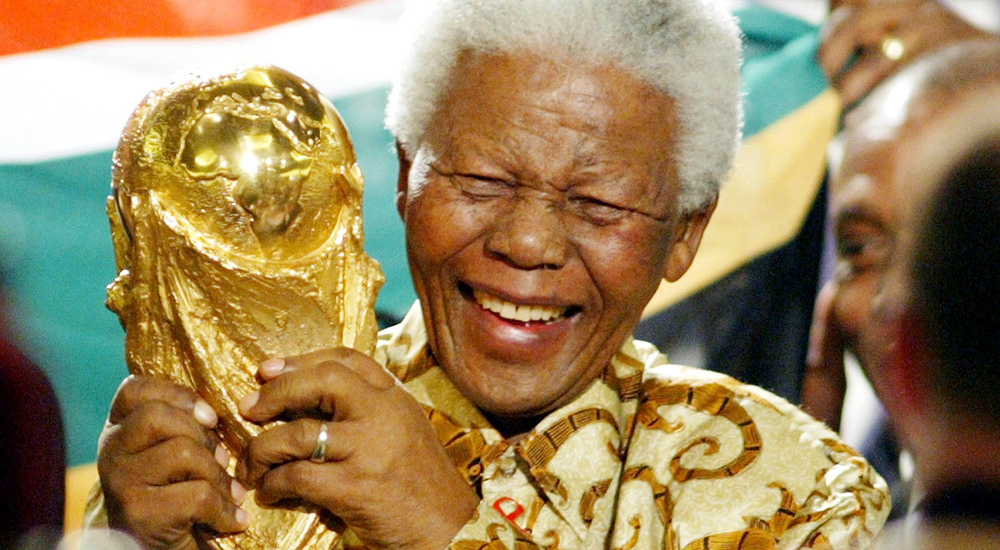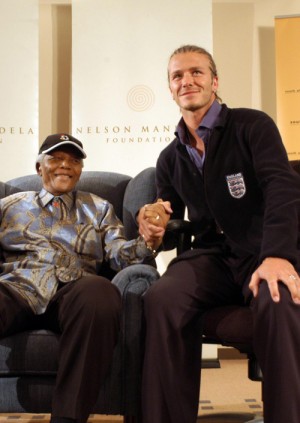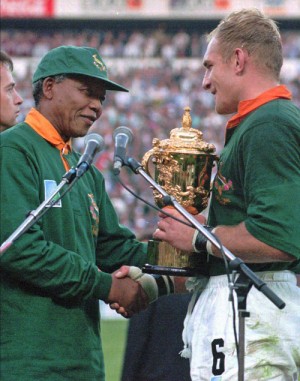Vast sporting tributes for Nelson Mandela

In this May 15, 2004 file photo, former South African President Nelson Mandela lifts the World Cup trophy in Zurich, Switzerland, after FIFA’s executive committee announced that South Africa would host the 2010 FIFA World Cup soccer tournament. Mandela was pivotal in helping the country win the right to host the tournament. South Africa’s President Jacob Zuma said, Thursday, Dec. 5, 2013, that Mandela has died. He was 95. (AP Photo/Michael Probst, File)
When it came to sport, Nelson Mandela had the ability to inspire even inspirational figures and leave global stars completely star-struck.
The former South African president, Nobel Peace Prize winner and anti-apartheid icon died Thursday at the age of 95, leading to a vast outpouring of emotional tributes from sporting bodies and the world’s best-known athletes.
“It’s sad for everyone who got a chance to not only meet him, but I’ve been influenced by him,” golfer Tiger Woods said. “I got a chance to meet him with my father back in ’98. He invited us to his home, and it was one of the inspiring times I’ve ever had in my life.”
Boxing great Muhammad Ali, a role model himself, said Mandela inspired others to “reach for what appeared to be impossible.”
“What I will remember most about Mr. Mandela is that he was a man whose heart, soul and spirit could not be contained or restrained by racial and economic injustices, metal bars or the burden of hate and revenge,” Ali said in a statement through his foundation.
Sportsmen and women loved Mandela more than perhaps any other political leader because Mandela, in turn, loved sport and appreciated its enormous power to do good.
Nowhere more than in his own country, where he famously used a rugby tournament in 1995, a year after democracy in South Africa, to completely knock down the last barriers of apartheid.

In this May 21, 2003 file photo, former South African President Nelson Mandela, left, poses with England’s soccer captain, David Beckham, in Johannesburg. South Africa’s President Jacob Zuma said, Thursday, Dec. 5, 2013, that Mandela has died. He was 95. (AP Photo/Shayne Robinson, Pool, File)
“A remarkable man who understood that sport could build bridges, break down walls, and reveal our common humanity,” International Olympic Committee President Thomas Bach said, calling Mandela “a true statesman.”
FIFA President Sepp Blatter said he and world football were in mourning at Mandela’s passing and ordered that the 209 flags of the world body’s member countries at FIFA headquarters in Switzerland be lowered and flown at half-staff.
“It is in deep mourning that I pay my respects to an extraordinary person, probably one of the greatest humanists of our time and a dear friend of mine: Nelson Rolihlahla Mandela,” Blatter said. “The memories of his remarkable fight against oppression, his incredible charisma and his positive values will live on in us and with us.”
A keen amateur boxer and runner in his youth, Mandela understood the intricacies of rugby, football and cricket, the most popular sports in his country, but even games and players the South African wouldn’t have been that familiar with were touched by him.
“Nelson Mandela was one of the most powerful and inspirational leaders in the world and a great friend of the NBA,” NBA Commissioner David Stern said, “… and while we mourn his passing, we know that his legacy and quest for equality will endure.”
LeBron James said: “In his 95 years, he was able to do unbelievable things not only for South Africa but for the whole world. What he meant to this world while he was able to be here, is everything.”
Sport was never far from Mandela’s mind and he was on hand when South Africa returned to the Olympic family, won rugby’s World Cup, won football’s African Cup and earned the right to host FIFA’s World Cup in 2010, the first in Africa. It was fitting also that Mandela’s last appearance in public was at a great sportingcelebration when he greeted fans in a packed stadium on the outskirts of Soweto ahead of the 2010 World Cup final.
“When he was honored and cheered by the crowd … it was as a man of the people, a man of their hearts, and it was one of the most moving moments I have ever experienced,” Blatter said.
A string of Spain’s World Cup winners from that year and Portugal’s Cristiano Ronaldo tweeted messages of condolence, with many including photographs of themselves with Mandela. Global superstars Woods and David Beckham both made a point of meeting Mandela.
But Mandela’s interest in sport wasn’t just for the grand occasion.
Recalling his first meeting with a still imprisoned Mandela in 1986, former Australian prime minister Malcolm Fraser said Mandela’s first question was about cricket, Australia’s most loved sport.
“His first remark to me, after hello, was … ‘Mr. Fraser is (famous cricketer) Donald Bradman still alive?'”

In this June 24, 1995 file photo, South African rugby captain Francios Pienaar, right, receives the Rugby World Cup from South African President Nelson Mandela, left, who wears a South African rugby shirt, after they defeated New Zealand in the final 15-12 at Ellis Park, Johannesburg. South Africa’s President Jacob Zuma said, Thursday, Dec. 5, 2013, that Mandela has died. He was 95. (AP Photo/Ross Setford, File)
Fraser later brought him a bat signed by Bradman, considered cricket’s greatest batsman ever, “in recognition of a great unfinished innings.”
What Mandela did with rugby at that 1995 World Cup final is remembered as one of world sport’s defining moments and is enshrined in the new South Africa’s conscience.
By pulling on the green and gold jersey of the Springboks, the national team previously all-white and associated with the apartheid regime, Mandela reached out to all South Africans to unite. Presenting the trophy to the victorious home team’s blonde-haired captain, Francois Pienaar, then provided a lasting image of South Africa’s reconciliation that politics couldn’t match.
“It was our privilege to have lived in this country during his lifetime,” South African Rugby Union President Oregan Hoskins said in a statement from the sporting body perhaps closest to Mandela. After 1995, Mandela used to call the team that once represented apartheid “my beloved Springboks.”
Even for New Zealand’s losing rugby captain on that day, Sean Fitzpatrick, Mandela’s effect was too momentous not to appreciate.
“Afterwards, when we were driving back to our hotel crying, to see the sheer enjoyment of everyone running down the streets … black, white, colored, whatever they were, just arm in arm celebrating sport,” Fitzpatrick said. “He saw the bigger picture of how he had to unify the country and sport has the power to do that. They were the better team on the day and they certainly had a helping hand from Mr. Mandela, that’s for sure.














